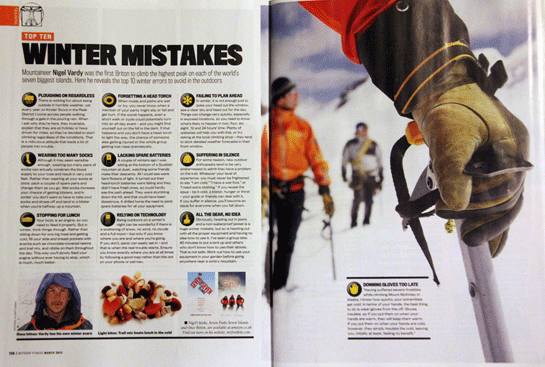In the second of my media blogs, I’d like to talk about the print world of magazines and newspapers. Though the internet is rapidly making inroads into this world, printed articles still have an extremely important part to play in modern media.
The days of reporters falling over each other for your story are gone, due to the inroads that the Internet has made. Local papers are struggling to compete with the amount of free news available on the web, and many interviews are now conducted over the telephone, with a reporter at the news office to save time. Here are a few tips…
- Always speak clearly, give your story and don’t feel offended by the journalists questions. The reason I say this is you will know the story well – the reporter won’t, so you may have to explain the background and some simple facts to lay the foundations of the article. I often get asked where I’m from, my full name and my age, which is used to open the piece.
- Have notes and facts ready, as this will make the interview simpler and quicker. As a mountaineer I always have summit heights, dates etc. to hand.
- If you’re asked to send in photographs, check the e-mail address is correct. You may be asked to send them to a photographer’s e-mail, so check! Make sure the images are of sufficient quality to be useful (but don’t clog up the inbox) and that you have the copyright or permission to use them. I check with the photographers what their preferred size/format is.
- Please understand that editors have only a certain amount of space to use, so expect articles to be edited to fit. These days I’m often asked to write the piece myself. This suits me fine as I get to put my points forward, and if anything is wrong, then it’s my fault. Please don’t miss deadlines as editors can’t adjust them and if they say 1500 words, they mean it! The last thing an editor wants is an article they have to take excessive time over re-writing.
- Never think local is too small. Many journalists find stories in local publications, which make the national press. Once you’re published, your name is out there and others may contact you. Remember that many printed newspapers and magazines also appear on the internet..!
- Sadly there is a great deal of bad press about education these days. Stories of poor behaviour and failed OFSTED reports put a shiver down every head teachers spine, but here’s a tip for good press. I speak regularly in schools and during the initial booking I always advise them to contact the local papers and see if they are interested in a story. This is good for everyone as the school get ‘good news’ coverage, the press are happy and I get free PR.
You might wish to approach a publication to become a regular contributor. I’d like to bring in freelance journalist Anton Rippon as an expert in this field. We’ve known each other quite a while and I’ve always admired his work. Here’s a few pointers from Anton…
“For me, the most important things when approaching an editor are…
- Make sure that you’ve studied the publication first and that you have a real feel for what it does. There’s nothing more inclined to annoy an editor than an unsolicited submission from someone who clearly doesn’t “know” the paper or magazine.
- Underline your credentials – your qualifications and experience – for writing the article.
- Try to find a topical peg on which to hang your piece. It could be a news item, or it could be an anniversary.
- Be innovative, bring fresh ideas or experience. Don’t rehash old stuff. You’ll be found out straight away. And probably never considered again.
- Be a problem solver. Hit deadlines, provide good, clean copy. Get it into the editor’s head that here is someone upon whom they can rely to fill a gap in their publication, maybe again and again.
It’s becoming harder and harder to break into freelance journalism these days. Newspapers and magazine publishers will often say that they “have no budget” for freelancers. More and more are filled with material that’s not been paid for, supplied by people who just want to see their name in print.
An old newspaperman once told me: “A man who works for nothing and a woman who makes love for nothing are never out of a job. Actually, I cleaned up the last bit but you get the idea. To put it another way, Samuel Johnson said: “No man but a blockhead ever wrote, except for money.” I certainly don’t give my work away. If an editor likes your article, then they should pay you for it.”
One important point that Anton made was giving your credentials as editors want experts in their field. Here’s how Anton writes his…
“Anton Rippon has spent all his working life in newspapers and publishing. He was a feature writer at the Derby Evening Telegraph and Nottingham Evening Post before becoming a freelance. His work has appeared in The Times, Guardian, Independent and Sunday Telegraph, and countless magazines. He is the author of 35 books, mostly on sport.”
So there you have it. I’d like to say thank you Anton for his help and expertise in the writing of this blog. Talking of which…
My third media blog will be about working in Television…
